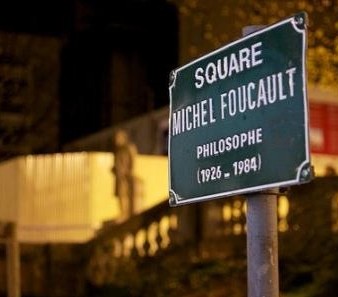In a recent blog, Michael Gallagher called ‘Orwellian readings of Foucault’ into question. These emphasise the ubiquity of power as it becomes manifest through the disciplinary gaze: The gaze cannot be escaped, and so individuals act in conformity with dominant norms; few spaces remain where abnormal behaviour can be indulged in private. The panopticon has become the dominant cypher for Foucauldian understandings of power, leaving other operations, other regimes of force unexamined.
Gallagher is right, there is much to be gained by looking beyond Discipline and Punish to Foucault’s oeuvre as a whole. But it is also important to subject Foucault’s work on disciplinary power to closer inspection. It is true that Jeremy Bentham’s circular prison, the ‘panopticon’ is the metaphor typically used to represent disciplinary power, blocking more refined, and locally specific understandings of its operations. And yet, as a metaphor, it makes some important points. It demonstrates how a disciplinary architecture might support the automatic functioning of power, where inmates become the bearers of the system that subjects them. Unable to discover precisely when they are being observed, inmates act as if observation were constant. By referring to this feature of the ‘panoptic’ gaze, we avoid any reduction of disciplinary technique to a simple method of dominatory control, for disciplinary power is said to operate through the dispositions and hence ‘freedoms’ of those it moulds.
Of course, the panopticon was only the diagram of a mechanism of power that has been reduced to
its ideal form, and by virtue of this reduction, details were lost. Elevating this optical system to a central metaphor of disciplinary power generates a refracted and shallow understanding of disciplinary potential. To the extent that disciplinary power was able to function with any success, it relied on many other techniques that were distributed throughout the disciplinary institution.
I have explored some of these techniques by locating them within the specific context of the early-nineteenth century monitorial school – see my recent paper The examined life: On the formation of souls and schooling. This short-lived educational institution was celebrated for its economies of labour, time, expense and punishment. It was the archetypal disciplinary institution. Even though it embodied this mode of power in a concentrated form, it relied on the distributed nature of its disciplinary techniques. Power was not concentrated in the ‘head’ of the school, but was spread throughout its architectures, functions and functionaries.
Disciplinary power does have its limitations, both as a mode of power and as a theoretical framework for understanding power. It operates according to a principle of complete reconstruction, seeking to shape its subjects in terms of its pre-established norms. Today, every ‘good’ educationalist would be quick to denounce the deleterious effects of pre-conceived ideas. This typical reaction allows us to believe that other approaches, strategies that listen to and respect their subjects seeking to optimise rather than shape individuality, are comparatively benign. This would be a profound mistake.
During the nineteenth century a parallel tradition of schooling was developed, which has been just as influential in shaping the subjectivities of educators and educated alike. The history of the monitorial school must be placed alongside its rival, the moral training school, which inaugurated an educational tradition in which ‘free play’ and ‘democratic accountability’ entered the educational landscape. This tradition makes a virtue of pedagogies that pay attention to the natural environment and dispositions of the child. The child is located, very explicitly, at the centre of a moral scheme that is just as pernicious, if not more so, due to the skill by which it conceals its activities. To prioritize and listen to the child, to respond to the child, in the child’s own terms, embeds the child more firmly in a framework of power that has become so widespread that it is barely perceived.
About Ansgar:
ANSGAR ALLEN is a lecturer in education at the University of Sheffield, School of Education, 388 Glossop Road, Sheffield, United Kingdom S10 2JA; e-mail: a.allen@ sheffield.ac.uk. His research explores the joint histories of assessment, meritocracy, and schooling as they relate to broader social processes, discourses, and regimes of power. He is currently writing a book on meritocracy, titled After fairness: A history of meritocracy, to be published by Palgrave Macmillan in 2013.
You can follow Ansgar on Twitter @ansgarallen.
References
Allen, A. (2013) ‘The Examined Life: On the Formation of Souls and Schooling’ American Educational Research Journal 50 (2), 216-250.











Hi!
Is there an implication that such practices and effects are deliberately inimical? Or are we victims of our histories , and as such are not conscious of our crimes?